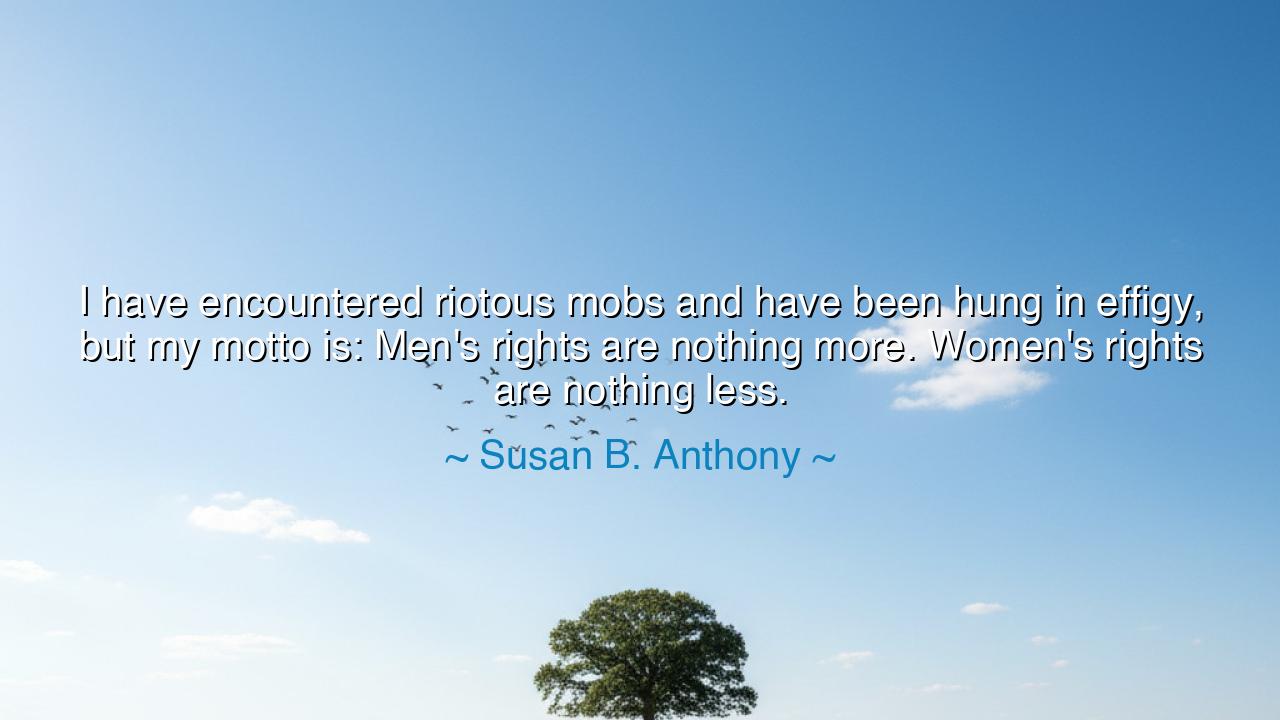
I have encountered riotous mobs and have been hung in effigy
I have encountered riotous mobs and have been hung in effigy, but my motto is: Men's rights are nothing more. Women's rights are nothing less.






Hear, O seekers of justice, the voice of Susan B. Anthony, who endured scorn and wrath, yet proclaimed with unyielding clarity: “I have encountered riotous mobs and have been hung in effigy, but my motto is: Men’s rights are nothing more. Women’s rights are nothing less.” These words are both shield and sword, a creed born of battle, and a call that still resounds across the ages.
For Anthony did not speak as one untested. She had faced mobs, endured ridicule, and saw her likeness burned in hatred by those who feared her cause. Yet she declared boldly that the rights of women are not a favor, not a gift, but a rightful share in the inheritance of humanity. To her, there was no hierarchy in dignity: men should have nothing more, and women nothing less, than the full measure of justice.
Consider the long struggle of the suffragists. Anthony, alongside Elizabeth Cady Stanton and others, fought for decades against entrenched prejudice. In 1872, she herself cast a ballot in defiance of the law, was arrested, and fined for her act. Yet she carried her conviction to the courts of public opinion, repeating again her immortal words. The act of voting, denied to women, was the battlefield where she waged her righteous war—not with weapons, but with the unshakable demand for equality.
The motto she gave is not a cry of conquest but of balance. It does not diminish men, nor exalt women above them. It proclaims instead the simple truth: that justice is indivisible. Where one is denied, all are diminished; where both are equal, humanity stands whole. Her words expose the folly of those who feared women’s freedom, for equality is no theft—it is restoration.
Therefore, let these words endure: women’s rights are nothing less than human rights, and their pursuit is not rebellion, but righteousness. Anthony’s courage, tested in fire and hatred, lit the way for generations to come. Her motto is a covenant for the future: that dignity, liberty, and voice belong not to one half of the world, but to all. And when all walk in equality, then shall true justice reign.






Ttrrtrt
Susan B. Anthony’s quote is as powerful as it is relevant today. It’s a reminder of how far women’s rights have come, but also how much further we still have to go. There are still so many instances where women are not given equal rights or opportunities, especially in male-dominated fields or leadership positions. Do we have a clear, actionable path to true equality, or are we still simply talking about it? What changes need to be made to ensure women’s rights are seen as truly equal to men’s?
HDHuynh Duong
Reading Susan B. Anthony’s quote makes me think about the lengths to which people must go in order to make their voices heard, especially when challenging deep-seated societal norms. She faced opposition, yet she stood firm. But even now, do we still find ourselves fighting for the same basic equality she spoke of? How many barriers are still left for women to break through? Her statement raises the question: are we truly living in a society where women’s rights are seen as equal to men’s?
LDNguyen Tran Linh Dan
Susan B. Anthony's quote really challenges the idea of gender inequality. She endured public hostility, yet she persisted. The fact that she equated men’s and women’s rights shows the profound importance of equality. In a world where women still face challenges in the workforce, politics, and even in day-to-day life, this quote serves as a powerful reminder that equality is non-negotiable. How do we continue to push for these fundamental rights to be recognized as equal and inherent to all individuals, regardless of gender?
Kkhoa
Susan B. Anthony’s motto speaks to the core of the struggle for women’s rights. Her ability to withstand adversity and continue her fight for equality is admirable. But in today’s world, where do we stand on this issue? Are women’s rights still treated as ‘less’ in some areas? The push for equality seems to be an ongoing battle, whether it’s in politics, the workplace, or the home. What steps can society take to ensure that women’s rights are treated as equal to men’s in every sphere?
TDLionel Tien Dat
This quote from Susan B. Anthony is such a bold and strong reminder of the fight for gender equality. Her perspective shows that rights should not be up for negotiation based on gender. However, in today’s world, do we still see women’s rights as secondary or less important? It’s hard not to notice that while progress has been made, gender inequality continues to show up in various aspects of society, from the wage gap to representation. What more can we do to honor this motto?